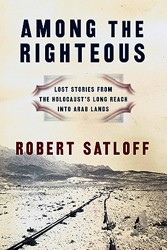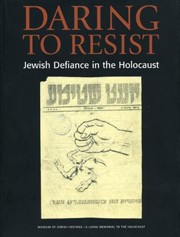The standard scholarly work on the Holocaust in Hungary remains The Politics of Genocide: The Holocaust in Hungary, 2 vol., by Randolph L. Braham. But for the general reader, Ronald Florence’s Emissary of the Doomed is a compelling history of the tragic circumstances surrounding the Nazi deportation of more than 400,000 Hungarian Jews to their death in Auschwitz. Florence, both a historian and a novelist, retells this catastrophic event through the travails of Joel Brand, a Hungarian Jew and a member of Budapest’s Jewish Rescue Committee, who was selected by Adolf Eichmann for the purpose of sending him to the West to negotiate the barter of one million Jews for heavy duty trucks.
Although the deportation of Jews to the death camps from much of German-occupied Europe took place throughout the course of World War II, the some 800,000 Jews of Hungary seemed relatively untouched by the war until 1944. Hungarian Jews did not wear yellow stars, were not confined to ghettos, and did not have their personal property and residences expropriated, as was the case in Jewish communities under Nazi domination, until March 1944, when Germany occupied the country. Under German rule, the Jews of Hungary were subjected to the same cruel oppression as were the Jews in the rest of Nazi-controlled Europe. Although the war was already turning against Germany, the Nazis were determined to implement the Final Solution in Hungary. Eichmann, who was responsible for the efficient deportation of Jews to the death camps, left his administrative post in Berlin to personally supervise the deportation of the Hungarian Jews to Auschwitz. Enter Heinrich Himmler.
Sensing that Germany would be defeated, Himmler, without the knowledge of Adolf Hitler, secretly sought to open up peace negotiations with the Allies. Himmler’s strategy apparently was to also divide the United States and Great Britain from their Soviet allies. Hence the origins of the notorious ‘trucks for Jewish lives’ offer, wherein Himmler promised not to use heavy-duty trucks against the West. In exchange, Himmler, through Eichmann, promised to halt the deportation of Jews to Auschwitz, thus saving the lives of millions of Jews designated for the gas chambers. Himmler, like most Nazis, believed that Jews were pulling the strings behind the Allied governments and thus was convinced that saving the lives of millions of Jews was a priority among the Allies. Joel Brand’s mission was to approach the Allies with Himmler’s proposal. Brand’s mission, however, was futile from the beginning because of the Allied policy of “Victory First,” which not only demanded Germany’s unconditional surrender, but also prohibited under any circumstances the use of military means (including the bombing of Auschwitz) for rescue, aid, or barter for those, like the Jews, who faced death at the hands of the Nazis. The Allied policy was imbedded in the refrain that the quickest way to save lives was to win the war. Jews were not only not a high Allied priority, the saving of their lives was not even a serious consideration.
As the emissary of the doomed, Brand is depicted by Florence as a tragic figure and everyone else (not only the Nazis, but the Allies as well as the Jewish Agency in Palestine, which refused to challenge Allied policy) emerge as callous to the fate of Hungarian Jewry. Finally, Florence weighs in on the controversy surrounding Rezsö Kasztner, Sr. who, like Brand, dealt with Eichmann and other Nazis in Hungary in an effort to rescue Jews from their impending deportations to Auschwitz. Kasztner was assassinated in Israel in 1957 by a gunman who believed that he had betrayed the Jews of Hungary by not warning them of the Nazis’ intention to deport Hungary’s Jews to the gas chambers.





